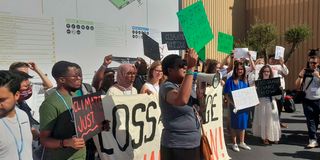Urgent Call to Action on the Loss and Damage Fund

Loss and damage finance protesters at COP27 on November 11, 2022 . Photo| pool
What you need to know:
- Empowering communities with direct access to financial assistance, allowing them to decide on funding priorities, ensures a fairer approach to addressing these challenges
- The loss and damage fund emerges as a lifeline for those tackling the irreversible impacts of climate change.
In the global climate negotiations arena, where every inch gained is a monumental achievement, creating a "loss and damage" fund marked a historic breakthrough for developing countries negotiators at COP27.
After grappling with complexities and competing interests, participants agreed on a pivotal decision— the World Bank would temporarily host the fund for the next four years.
The fifth session of the transitional committee (TC5) on the loss and damage fund convened to lay the groundwork for the fund’s operation, covering crucial aspects such as governance, location, and funding sources.
In a prior briefing, Ambassador Pedro L. Pedroso Cuesta, chair of the G77+ China, stressed the fund's independence, advocating for its hosting under the UN Climate body. He emphasised that affluent nations must lead in funding the initiative, adhering to the principles outlined in the Paris Agreement on common but differentiated responsibility (CBDR). This principle acknowledges the different capabilities of individual countries in addressing climate change.
While the world struggles with climate change, communities in developing countries have the least resources to respond, resulting in ‘loss and damage,’ extending beyond adaptability or the resources communities possess to recover.
But why is this fund so important?
Imagine the plight of a coastal village battered by rising sea levels, a farmer struggling with unprecedented drought, or a city wrestling with heat waves. The loss and damage fund is a critical notion, a safety net for those enduring irreparable losses and damages due to climate change impacts.
The loss and damage fund provides financial assistance and support to those left dealing with the aftermath of climate-induced losses. It's about recognising communities' injustices, contributing the least to climate change but bearing the biggest burden.
Empowering communities with direct access to financial assistance, allowing them to decide on funding priorities, ensures a fairer approach to addressing these challenges. Given that loss and damage, particularly non-economic aspects like the loss of culture, language, spiritual sites, education, and opportunities, is profoundly personal and context-specific, prioritising community self-determination becomes crucial at the core.
The outcomes of TC5's decisions on loss and damage could resonate significantly at COP28. The compromise has left an impactful exclusion, setting the stage of severe implications. Overcoming the trust and ambition deficit created by the United States and affluent nations becomes imperative for COP28 to align with the urgent demands of science for climate action.
During the final TC5 meeting ahead of COP28, developed nations pressed developing countries to accept recommendations that neglect fundamental principles of climate justice and fairness. The lack of commitment from wealthy nations to finance the loss and damage fund is a stark betrayal of vulnerable communities facing the harshest impacts of the climate crisis. Will the EU exert pressure on the US and other developed nations or stand in their shadow? True climate justice demands tangible actions, not just empty rhetoric.
As we approach COP28, civil society's input becomes paramount. Their perspective ensures that the loss and damage fund is not a mere theoretical concept but a practical solution addressing the needs of those most affected. Their voices hold leaders accountable, urging them to take concrete actions and allocate adequate resources to support communities facing the harsh realities of climate change.
The loss and damage fund emerges as a lifeline for those tackling the irreversible impacts of climate change. Civil society's input ensures that this fund transcends being a mere line item in an agreement but a beacon of hope for communities on the frontlines of the climate crisis. As decisions unfold at COP28, let's remember that every voice must count for the sake of our planet's future.
Michelle Nambiro is a Climate Communication and Advocacy specialist.


